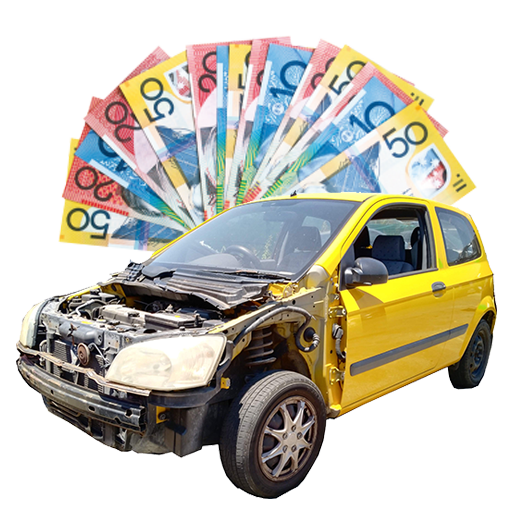So, you've got an old car sitting in the driveway, and it's time to say goodbye. Figuring out how to get rid of it can feel like a massive chore, but it's simpler than you might think. From selling it for scrap to donating it, you've got a few solid options for disposal of cars.
Why Responsible Car Disposal Matters
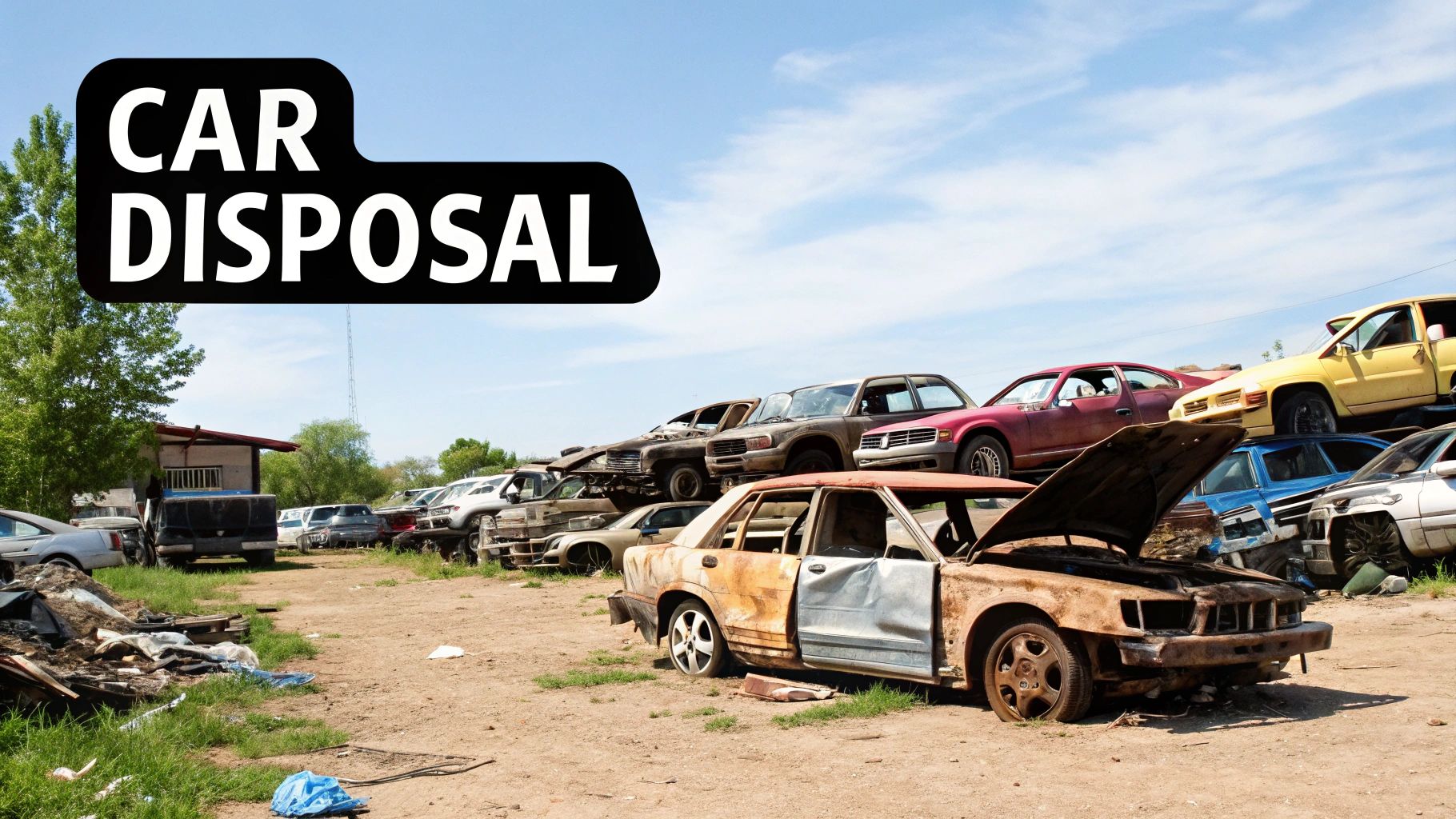
Choosing the right way to dispose of your car is about more than just freeing up space. It’s a major environmental decision. An old vehicle left to rust can leak nasty fluids like oil, antifreeze, and brake fluid straight into the ground, which is a disaster for local soil and water.
The problem is bigger than most people realise. Every year in Australia, around 850,000 vehicles hit the end of the road, creating a staggering 1.36 million tonnes of waste. While we do a decent job recycling about 70% of that, a huge amount still isn't handled correctly. These vehicle waste findings really put the scale of the issue into perspective.
The Benefits of Proper Disposal
This is where professional removal services come in. They know exactly how to handle a car at the end of its life in an eco-friendly way. The first step is always to safely drain all those hazardous fluids, following strict environmental guidelines.
Once the car is drained, it's carefully dismantled. Any parts that are still in good shape are salvaged to be used again. The rest of the car, mostly the metal body, gets shredded and sent off for recycling.
This whole process delivers some fantastic benefits:
- Keeps Landfills Clear: Cars are bulky and take up a ton of space. Recycling keeps them out of our already-strained landfills.
- Saves Resources: Making steel from recycled metal uses way less energy and raw materials than starting from scratch.
- Stops Pollution: It prevents toxic chemicals from poisoning our environment.
By choosing a proper disposal method, you’re doing more than just getting rid of an eyesore. You're taking part in a circular economy, ensuring valuable materials are recovered and reused, and helping protect the planet for the future.
Deciding what to do with your old car can be overwhelming. To help you figure out the best approach for your specific situation, here's a quick breakdown of the most common options.
Car Disposal Options at a Glance
| Disposal Method | Best For | Potential Payout | Effort Level |
|---|---|---|---|
| Cash for Cars/Scrap | Non-running, damaged, or very old cars where the value is in the metal and parts. | Low to moderate, based on vehicle weight and current scrap metal prices. | Low |
| Private Sale | Cars that are still running, have a current roadworthy certificate, or are desirable models. | Moderate to high, depending on the car's condition and market demand. | High |
| Trade-In at a Dealership | A running car when you're buying a new or used one from the same dealer. | Usually lower than a private sale, but convenient. | Low |
| Donating to Charity | Any car, running or not, if you want a tax deduction and to support a cause. | Tax deduction, not direct cash. | Low |
| Auto Wreckers | Cars with valuable or rare parts that can be salvaged and sold individually. | Varies greatly depending on the parts. | Medium |
Each of these paths has its own pros and cons. Think about how much time you're willing to invest and what you hope to get out of it—whether that's top dollar, a tax break, or just a hassle-free removal. This guide will walk you through turning that unwanted vehicle into a solved problem, giving you the confidence to handle the process smoothly.
Getting Your Car Ready for Removal
Before the tow truck arrives to take your old car away, a little bit of prep work can make a world of difference. It’s not just about making the process smoother; it’s your last chance to make sure you haven’t left anything important behind.
First things first, give your car a proper once-over. We all accumulate stuff in our vehicles over the years. Check absolutely everywhere: the glove box, under the seats, in the boot, and any other nooks and crannies. You might be surprised by what you find—from old sunglasses and CDs to important paperwork or a handful of spare change.
To Strip or Not to Strip Parts?
Now for the big question: should you pull any valuable parts off the car before it goes? It’s tempting to think you could sell things like the battery, a high-end sound system, or a decent set of tyres for extra cash. And sometimes, you can.
But hold on a moment. Many car removal companies base their offer on the car being complete. If you start stripping it for parts, you might actually find they offer you less for the vehicle itself. It really depends on their process and what they value.
My Advice: Before you even think about reaching for a spanner, have a chat with the removal company. Just ask them outright: "Will I get a better price if I leave the car as is, or can I remove the battery and stereo?" A quick phone call can clear this up and ensure you get the best possible deal.
If you're still on the fence about whether it's even time to say goodbye to your old vehicle, our guide on when to get rid of an old car can help you make that call.
The infographic below breaks down the key legal and environmental steps you'll encounter.
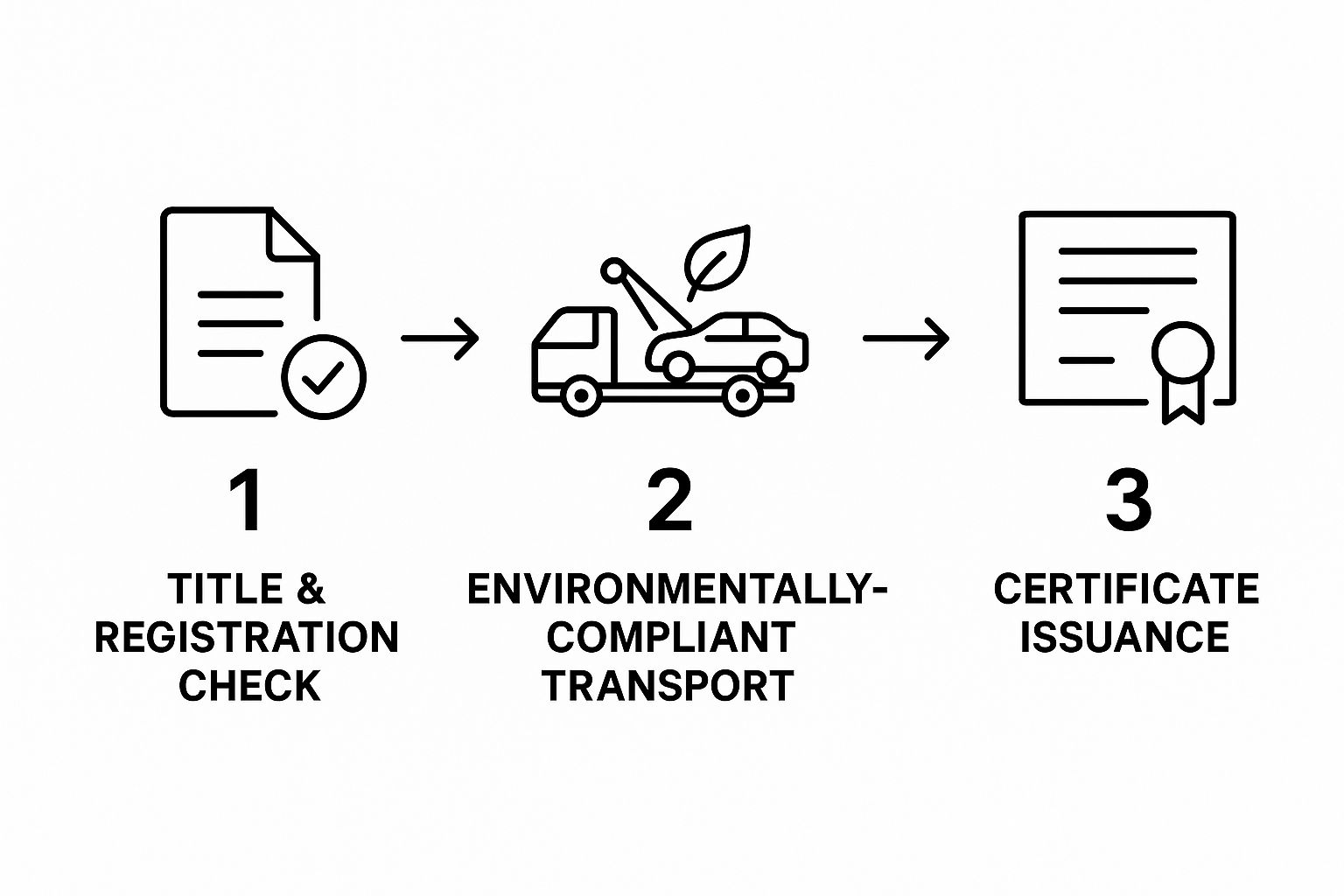
As you can see, properly disposing of a car is a well-defined process. It starts with sorting out the legal side and finishes with official certification, making sure everything is handled responsibly.
Navigating the Disposal Paperwork
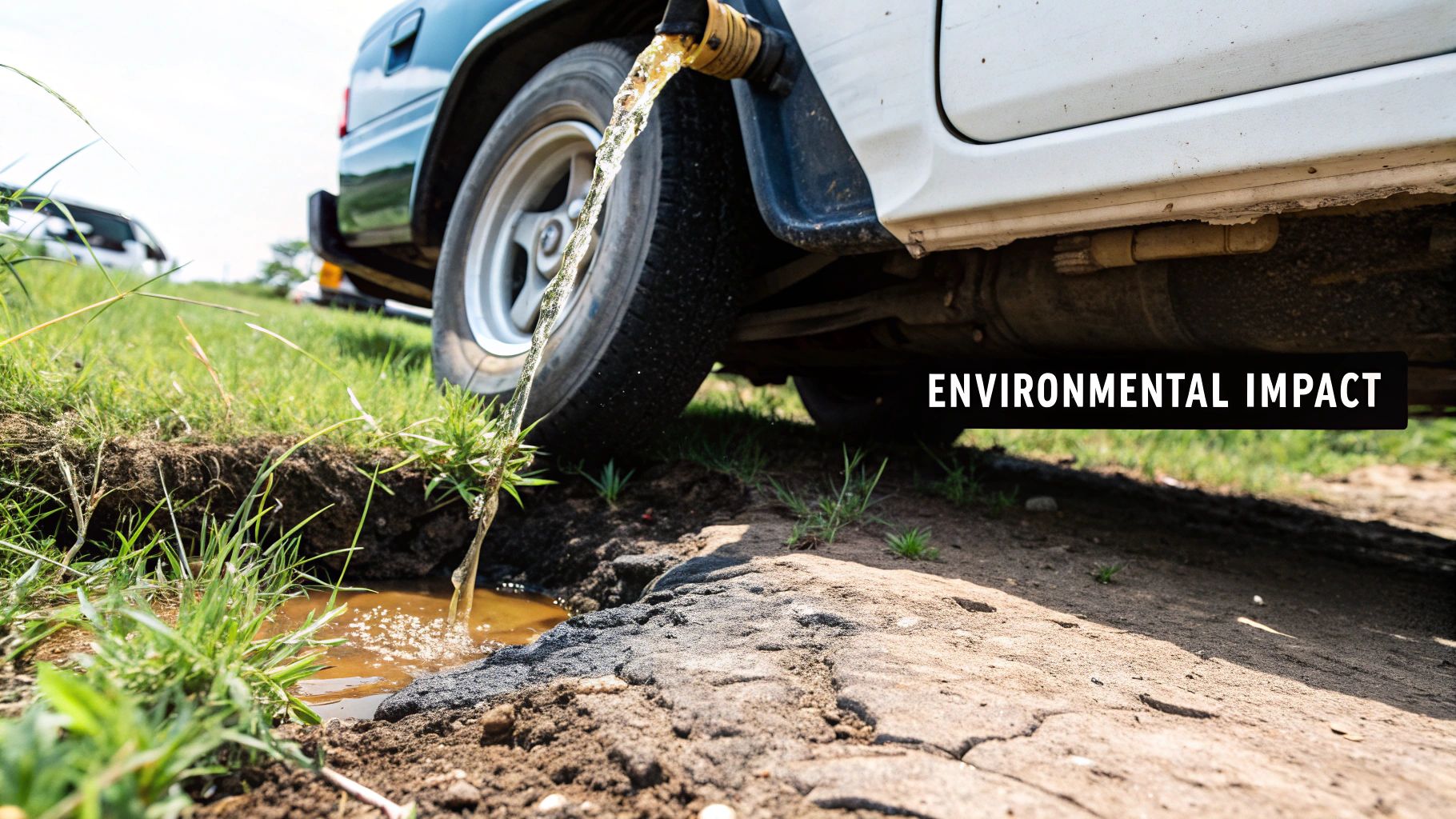
Let's be honest, nobody enjoys dealing with paperwork. It can feel like the most painful part of getting rid of an old car, but getting it right is non-negotiable. This is the step that legally transfers ownership and, most importantly, protects you from any headaches down the road. Think of it as the official handshake that ends your time with the vehicle for good.
First things first, you need to prove the car actually belongs to you. The key documents here are your Certificate of Registration and a valid photo ID. If you’ve misplaced the certificate—it happens to the best of us—you can typically get a replacement from your state or territory's transport authority.
Finalising the Legal Details
With your proof of ownership sorted, it's time to lodge a Notice of Disposal. This is a critical step that officially tells the government you're no longer the registered owner. It’s what shields you from any fines or infringements the car might rack up after it's been towed away.
Thankfully, most states now let you do this online, which is by far the quickest and most straightforward way to get it done.
Here’s a pro tip from experience: a common mistake is forgetting to cancel your insurance and registration after the car is gone. As soon as that tow truck rounds the corner, get on the phone. Don't keep paying for a car you no longer own—you might even be entitled to a refund.
With around 850,000 vehicles reaching the end of their life in Australia each year, proper documentation is essential for managing this turnover responsibly. Correctly lodging your disposal notice ensures your old car is tracked and handled according to national environmental standards. You can learn more about these national vehicle end-of-life strategies and why they matter by exploring the FCAI's policy priorities.
While it might seem like a lot to handle, it's really just a logical sequence of steps. For a more detailed walkthrough with state-specific advice, take a look at our ultimate guide to scrapping a car in Australia.
How to Choose a Reputable Car Removal Service
Finding the right company to take your old car off your hands is about more than just chasing the highest quote. You need a process that's legal, straightforward, and fair. The truth is, not all services operate to the same standard, and knowing what to look for will save you from major headaches and help you get the best deal.
First, it helps to know who you're dealing with. You’ll find a few different types of businesses out there: dedicated auto wreckers who see value in your car's individual parts, scrap metal recyclers who are only interested in its weight, and "cash for cars" services like ours that look at the vehicle’s overall value. The condition of your car usually points you toward the right type of service.
The Australian car disposal scene is mostly made up of small and medium-sized businesses that focus on dismantling end-of-life vehicles. A staggering 850,000 cars are scrapped each year in Australia, and these companies are crucial for recovering valuable parts and metals. You can get a deeper look into these industry structures on fcai.com.au.
Vetting a Service: What to Ask and What to Avoid
A trustworthy operator will always be upfront and clear in their communication. If a company is cagey about fees, doesn't have a visible business address or ABN (Australian Business Number), or tries to pressure you into a snap decision, consider it a major red flag.
When you start calling around for quotes, it's smart to have a few key questions prepared. This helps you compare apples with apples and weed out the dodgy operators.
Before you agree to anything, make sure you've vetted the company properly. Having a checklist of questions ready helps you compare services fairly and spot any potential issues before they become your problem.
Questions to Ask a Car Removal Service
| Question Category | Specific Question to Ask |
|---|---|
| Pricing & Fees | "Is the quote you gave me the final amount I receive?" |
| Towing & Removal | "Is the vehicle pickup and towing completely free, or are there hidden charges?" |
| Payment | "How and when will I be paid? Is it cash on collection?" |
| Licensing | "Can you provide your ABN and any relevant business licences?" |
| Paperwork | "Do you provide a receipt and help with the Notice of Disposal paperwork?" |
Getting clear, confident answers to these questions is a good sign you're dealing with a professional.
A key sign of a reliable service is their willingness to answer your questions without hesitation. If they avoid giving straight answers about licensing, payment, or paperwork, it’s best to walk away. Your goal is a hassle-free transaction, not a complicated ordeal.
What To Expect On Removal Day
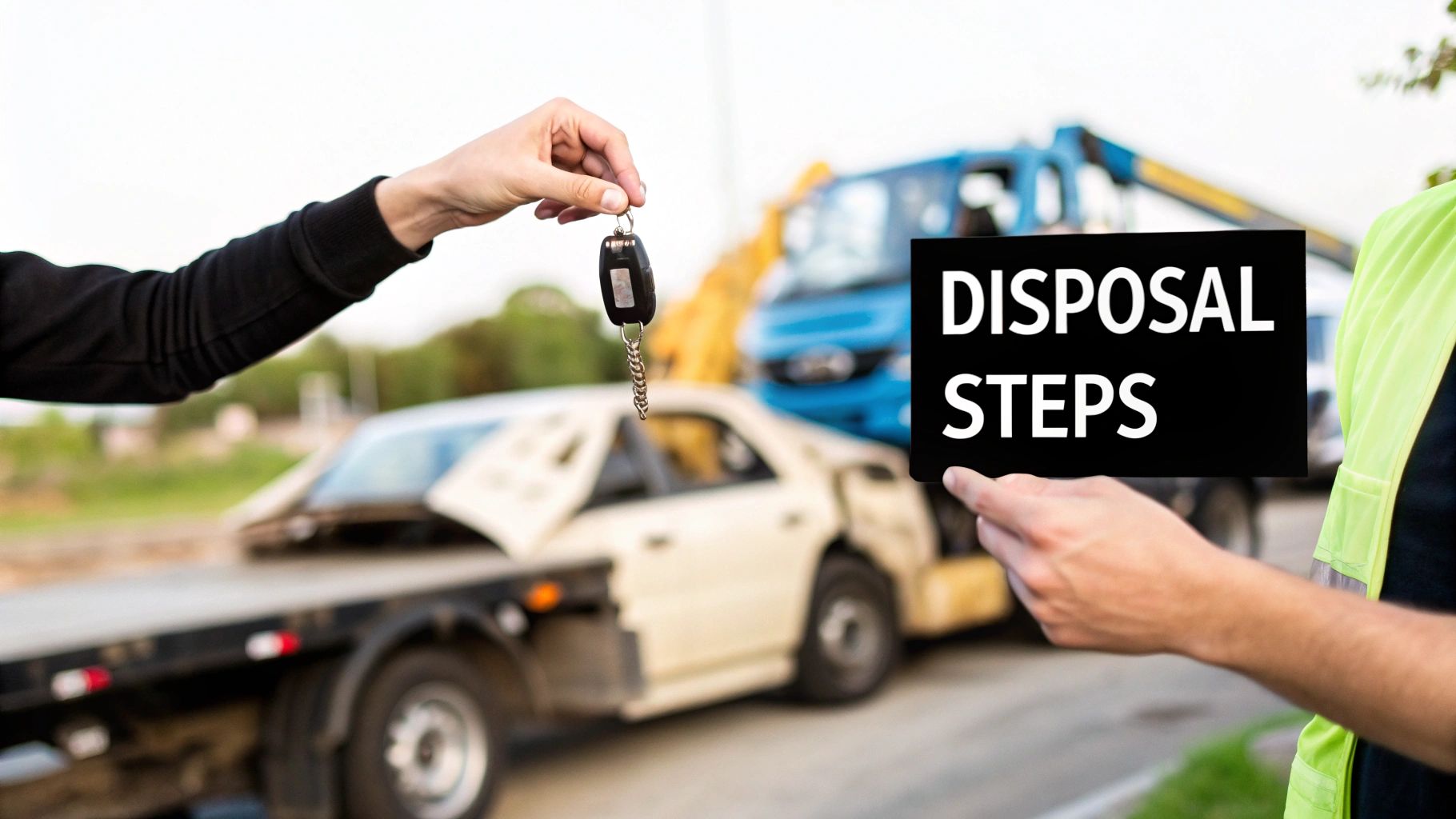
You’ve done the prep work and picked your removal service. Now comes the easy part: waving goodbye to that old car. So, what actually happens on the day?
Honestly, the whole process is surprisingly quick. I’ve seen countless removals, and from the moment the tow truck arrives to when it drives away, you’re usually looking at less than 30 minutes.
The removal company will have given you a pickup window. The best thing you can do is make sure the car is easy to get to. If it’s wedged in a tight spot—like a narrow garage or behind another vehicle—give them a heads-up beforehand. A quick phone call allows them to bring the right gear, which makes the job much smoother for everyone.
The Handover Process
When the tow truck driver arrives, they'll need a few key things from you to wrap everything up. Having these ready is the secret to a fast, hassle-free handover.
Make sure you have these on hand:
- Proof of Ownership: This is non-negotiable. Grab your Certificate of Registration or other official title documents.
- Your Photo ID: A current driver's licence or proof of age card is needed to confirm you are who you say you are.
- The Car Keys: Even for a total write-off, the keys are essential. They unlock the steering wheel, making it possible to tow the car safely.
The driver will do a quick walk-around to verify the car's condition matches the description you provided. After that, you'll sign the last of the paperwork. This usually involves signing over the ownership and getting a receipt for your records. If you're based in South Australia, our guide to free car removal in Adelaide covers the specifics you’ll encounter.
Get Paid on the Spot
One of the biggest perks of using a professional car removal service is the immediate payment. Once the paperwork is signed, expect to receive your cash or see an instant bank transfer. There's no waiting around for a cheque to clear.
It’s completely normal to have a few last-minute questions when you’re about to get rid of an old car. In fact, I'd be more surprised if you didn't. Making sure you have clear answers is the best way to guarantee a hassle-free experience and get a fair price for your vehicle.
Let's tackle the big one I hear all the time: "What's my non-running car actually worth?" When a car won't start, its value really boils down to two things: its weight in scrap metal and the value of any parts that can be salvaged. The market price for scrap steel goes up and down, but any decent car removal service will give you a straight-up quote based on your car's make, model, and condition.
Environmental Impact and Other Details
People are also increasingly conscious of the environmental side of things, and rightly so. Choosing a professional removal service is a massive win for the environment. It ensures that all the nasty stuff inside a car is managed properly.
- Fluid Drainage: All those liquids—oil, coolant, transmission fluid—are drained safely, preventing them from seeping into the soil and our waterways.
- Parts Salvaging: Good, working parts like alternators, mirrors, and even seats are pulled out and given a second life as affordable spares.
- Metal Recycling: You might be surprised to learn that over 90% of a modern car can be recycled. The steel body is shredded and melted down to make new steel products, which drastically cuts down on the energy and resources needed to mine for new materials.
Here's the bottom line: professional car scrapping is recycling in action. It keeps thousands of kilograms of metal, plastic, and glass out of landfills, making it the most responsible way to handle a vehicle that's reached the end of its road.
Finally, a common practical question is whether you need to be there when the tow truck arrives. For the most part, yes, you do. You'll need to be present to hand over the keys and sign the final paperwork. This is the crucial step that legally transfers ownership away from you and ensures you get paid right then and there. Being on-site makes the whole handover quick, simple, and secure.
Do you have an old, scrap, or unwanted car taking up valuable space? Auto Removal Adelaide can help you get rid of it fast. We pay up to $8,999 cash for cars and provide free removal throughout the Adelaide area. Turn that clunker into cash today by visiting Auto Removal Adelaide.

